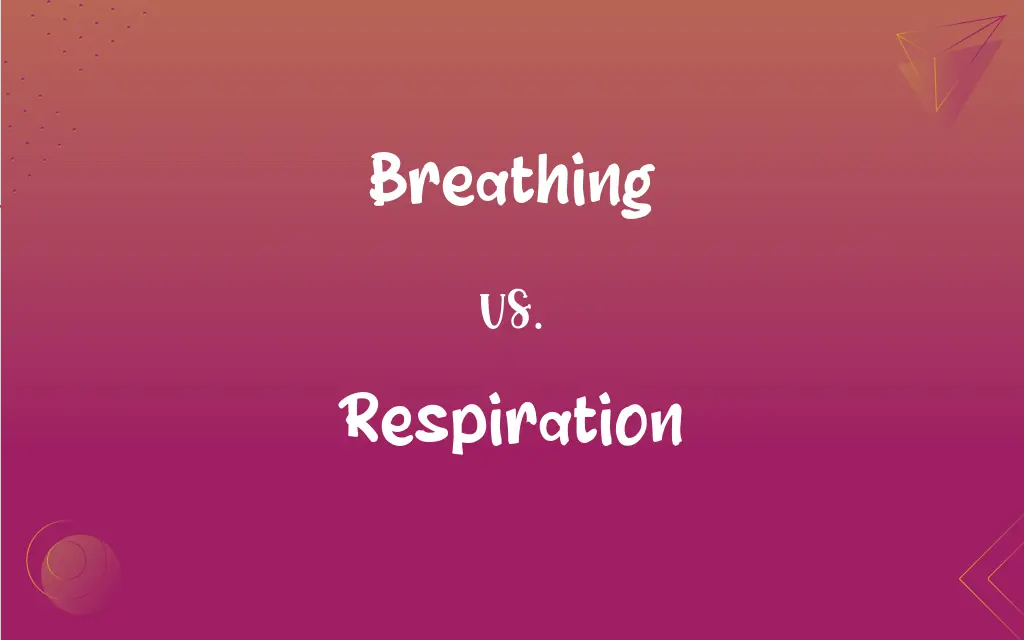Breathing vs. Respiration: What's the Difference?
Edited by Aimie Carlson || By Harlon Moss || Updated on October 25, 2023
Breathing is the physical act of inhaling and exhaling air, while respiration is the cellular process of producing energy from oxygen and nutrients.

Key Differences
Breathing is a mechanical process that involves the movement of air in and out of the lungs. This act is essential for life, as it ensures the delivery of oxygen to the bloodstream and the removal of carbon dioxide. Respiration, on the other hand, refers to a series of metabolic reactions taking place within cells. This process generates energy by breaking down glucose using oxygen.
Respiration's scope extends beyond the mere inhalation and exhalation linked with breathing. In fact, respiration happens at the cellular level, enabling organisms to produce the energy required for various functions. Breathing, conversely, is purely a physical act, reliant on the diaphragm, lungs, and associated muscles to function effectively.
Breathing's primary objective is to facilitate the exchange of gases. Oxygen is taken in from the environment, and carbon dioxide is expelled. This exchange is pivotal for the respiration process, which requires oxygen to produce energy. Without the act of breathing, the oxygen necessary for cellular respiration would be unavailable.
In many educational contexts, the terms breathing and respiration are sometimes used interchangeably. However, this can lead to confusion. While breathing is an external, observable act, respiration is an internal, cellular activity that converts biochemical energy from nutrients into adenosine triphosphate (ATP).
Comparison Chart
Definition
The physical act of taking in and expelling air.
Cellular process to produce energy from oxygen and nutrients.
ADVERTISEMENT
Level of Process
Organ level (e.g., lungs, diaphragm).
Cellular level.
Primary Function
Gas exchange (Oxygen in, Carbon Dioxide out).
Energy production.
Dependency
Depends on functioning respiratory organs.
Depends on enzymes and cellular structures.
Visibility
Observable externally.
Occurs internally, not directly observable.
Breathing and Respiration Definitions
Breathing
The physical process essential for life.
Without breathing, oxygen supply to the body ceases.
ADVERTISEMENT
Respiration
A series of reactions, often associated with mitochondria.
Oxygen plays a key role in cellular respiration.
Breathing
The act of inhaling and exhaling air.
During meditation, focusing on one's breathing can be calming.
Respiration
The cellular process generating energy from oxygen and glucose.
Respiration within cells provides energy for daily activities.
Breathing
The mechanism of drawing oxygen into and expelling carbon dioxide from the lungs.
Breathing becomes rapid during intense physical activity.
Respiration
A metabolic activity converting biochemical energy into ATP.
The rate of respiration increases during strenuous exercise.
Breathing
A rhythmic activity involving the respiratory system.
She noticed the baby's steady breathing while it slept.
Respiration
The mechanism by which cells break down food molecules.
Respiration ensures the body has a continuous energy supply.
Breathing
The exchange of gases between an organism and its environment.
Breathing in polluted air can harm health.
Respiration
An essential biochemical process for all aerobic organisms.
Without respiration, cells wouldn't function optimally.
Breathing
The act or process of respiration.
Respiration
The action or process of inhaling and exhaling; breathing. Also called ventilation.
FAQs
Is breathing only about inhaling oxygen?
No, breathing involves inhaling oxygen and exhaling carbon dioxide.
What does respiration involve?
Respiration involves cellular processes that produce energy from oxygen and nutrients.
Why is breathing vital for respiration?
Breathing provides the oxygen needed for the respiration process in cells.
Is breathing voluntary or involuntary?
Breathing can be both; it's mostly involuntary but can be controlled voluntarily.
Do plants undergo respiration?
Yes, plants undergo respiration to produce energy, distinct from photosynthesis.
What is breathing?
Breathing is the physical act of taking in and expelling air from the lungs.
Is cellular respiration the same in all organisms?
No, while the basics are similar, the specifics of respiration can vary among organisms.
How do we know when to breathe more rapidly?
The body senses increased carbon dioxide levels, signaling the need to breathe more rapidly.
Which is more critical for survival, breathing or respiration?
Both are crucial; breathing provides oxygen for respiration, which generates the energy needed by cells.
Can respiration occur without breathing in plants?
Yes, plants respire continuously but use mechanisms other than breathing to obtain oxygen.
What fuels are used in respiration?
Glucose is a primary fuel, but other nutrients can also be used in respiration.
How does breathing change during exercise?
Breathing becomes faster and deeper during exercise to meet the increased oxygen demand.
What's the end product of respiration?
The primary end products are carbon dioxide, water, and energy in the form of ATP.
Are breathing and respiration the same in water-dwelling creatures?
No, aquatic animals have specialized mechanisms, like gills, for breathing and respiration.
Why is aerobic respiration more efficient than anaerobic?
Aerobic respiration produces more ATP per glucose molecule than anaerobic respiration.
What happens if breathing stops temporarily?
If breathing stops, oxygen supply ceases, leading to potential harm or death if not resumed promptly.
Where does respiration mainly occur in cells?
Respiration primarily occurs in the mitochondria of cells.
Can one control their breathing?
Yes, while breathing is typically involuntary, it can be consciously controlled.
Why do we sometimes sigh or yawn while breathing?
These actions can help in regulating lung function and increasing oxygen intake.
How efficient is human respiration?
Human respiration is quite efficient, but a significant amount of the energy in glucose is lost as heat.
About Author
Written by
Harlon MossHarlon is a seasoned quality moderator and accomplished content writer for Difference Wiki. An alumnus of the prestigious University of California, he earned his degree in Computer Science. Leveraging his academic background, Harlon brings a meticulous and informed perspective to his work, ensuring content accuracy and excellence.
Edited by
Aimie CarlsonAimie Carlson, holding a master's degree in English literature, is a fervent English language enthusiast. She lends her writing talents to Difference Wiki, a prominent website that specializes in comparisons, offering readers insightful analyses that both captivate and inform.































































